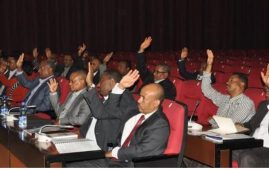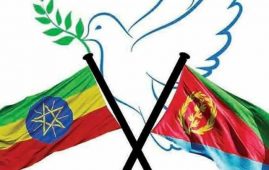Several western newscasts and blogs misleadingly blended sound bites from the EU Observers Preliminary Report with the Human Rights Watch statement when reporting the provisional results of the Ethiopian election.
All alike picked none but the phrases “marred by narrowing political space”, “uneven playing field” and “use of state resources” from the first page of the Preliminary Report, apparently the only section they bothered to read.
While the modest ones simply jumbled those phrases with the blatant line of the HRW statement “Behind an orderly façade…..”, as if the two documents are complementary. The aggressive ones took the liberty to conjoin each of the three phrases from the Report by extended citations from the HRW Statement, as if the later is an explanatory note of the former.
The blunder of such reporting is two fold. For one, it is grossly misrepresents the Preliminary Report which is mostly approving of the election. On the other hand, it bestows undue plausibility to the HRW statement by clouding its manifest flaws.
BBC seemed to have observed the incongruence between the two documents, as it refrained from similar blunders. However, as it turned out, it failed to note how flawed the HRW Statement is.
In his last Tuesday news report titled “Donor darling: What Ethiopian poll can teach Africa“, Will Ross, BBC’s correspondent in Addis Ababa commented,
“[the HRW Statement] clearly angered the government as it shone a light on allegations of repression that no election observer team would be able to find – partly because they were not allowed in the country early enough”.
It is one thing to suspect the Ethiopian government of repression by default. Yet, it is completely erroneous to take every allegation for granted. Especially, when one has the opportunity to weigh the veracity of the allegations. If Will Ross, being in Addis, having access to all key personalities, and mostly unbiased, failed to note the flaws of the HRW, then, presumably, no wonder other journalists with lesser ethical commitment and resource blundered.
Thus, here-under I made a conservative list of the glaring flaws in the 1 and 1/2 page HRW Statement. I challenge Will Ross, or any other interested person, to check these things by himself this weekend.
10 Glaring Flaws
Quotes from the HRW Statement, then a couple of leading questions indicating the most glaring mistakes are presented below. (Suspicious of misquotations? Please make a first-hand reading of the HRW Statement)
The HRW Statement stated, as a proof for its allegation of “Pressure to Register to Vote”:
In the weeks leading up to the polls, Human Rights Watch documented new methods used by the ruling Ethiopian People’s Revolutionary Democratic Front (EPRDF) to intimidate voters in the capital, Addis Ababa, apparently because of government concerns of a low electoral turnout. During April and May, officials and militia (known as tataqi in Amharic) from the local administration went house to house telling citizens to register to vote and to vote for the ruling party.[emphasis mine]
When? In April and May. Where? In Addis Ababa. Who? Militia/tataqi.
* Was there a voter registration in April and May in Addis?
* Is there a militia in Addis Ababa, or in any Ethiopian city for that matter?
* Is there a single person in Addis who mistake the police for militia or refers to it as militia or ‘tataqi’?
Again, the HRW Statement alleged “Pressure to Join the Ruling Party When Registering” by stating:
Different sources across the capital confirmed to Human Rights Watch that alongside registration, voters were requested to sign a paper, under a heading “Supporter of EPRDF,”[emphasis mine]
* If the situation was so overt, how come no opposition party mentioned it, even not in their lengthy post-election statements? I will concede to this allegation if it can be corroborated by even two of a randomly taken ten voters in Addis.
The “Pressure to Vote for the Ruling Party” was described by the HRW Statement as:
Residents also described an EPRDF pyramid recruitment strategy called One-for-Five. A coordinator (ternafi) had to identify five recruits or fellow voters (teternafiwoch) among family members, friends, colleagues or neighbors. Coordinators then tried to compel their five signers to go to the polling stations and vote all together. [Emphasis mine]
* What’s wrong with networking style campaigning? Didn’t Barak Obama use similar campaigning method? [In fact, as we speak, over 15,000 Democrat supporters are knocking doors and making phone calls across America to lobby for the upcoming Congressional election.]
* Hasn’t the EU-OM Preliminary Report stated that “Door-to-door canvassing was the main campaign method for all parties, which considered this to be the most cost-effective strategy“?
* If six voters (the ‘ternafi’ & ‘teternafiwoch’) were voting together how come the EU-OM Preliminary Report said ‘overall, the secrecy of the vote was respected”? Lest HRW is a news media, is it prudent for a research organization to draw conclusions and report within few hours? (HRW made the statement only about 10 hours after the closing of the polling stations.)
In its description of the “Pressure on the Media and Foreign Diplomats”, the statement says:
The government issued several codes of conduct covering media and diplomatic activity. Initial drafts of the media regulation restricted foreign and local journalists from even speaking to anyone involved in the election process, including voters on election day, in violation of the right to freedom of expression. [Emphasis mine]
* Is or was there a code of conduct for diplomats?
* Is there any provision with such restrictions, even remotely alike, in the ‘Code of Conduct for the Mass Media and Journalists’ issued on April 15/’10?
* How come an organization so informed as to tell us about the voting process within hours failed to know about a 40 days old Code of Conduct? Not to mention that the Code is available on the official website of NEBE. (Though the statement grossly misrepresents the draft, no need to bore you with that as it is, after all, a draft)
Moreover, the EU-OM Preliminary Report made not a single criticism with regard to the pre-election period or the polling day in Addis Ababa.
As noted at the beginning, this is a conservative listing of the flaws. I bet you can find more flaws and dubious claims if you make a critical reading of the statement.
At first, one is tempted to put the blame on the HRW’s informants in Ethiopia, assuming that HRW would not have gone astray otherwise. Though its hastiness to issue a statement parroting its informants is appalling, it is convenient to blame the informants rather than the top brass of HRW.
But that is only until you read what it said as a description of the “Repressive Context of the Elections”. The statement cites three things that make-up this ‘Context’. (Let’s save the two, the new NGO law and Anti-terrorism laws, for some other time). Here is the third one:
Since 2005, Human Rights Watch has documented patterns of serious human rights violations by the Ethiopian government. Members of the security forces and government officials have been implicated in numerous war crimes and crimes against humanity both within Ethiopia and in neighboring Somalia.
Of course, we have heard, a couple of years ago, HRW blamed the Ethiopian government for its successful military assault in Somalia & Ogaden, as usual, simply pilling up all allegations made by Al-Shabab and ONLF.
But, what does that has to do with this election? Does HRW belittle the democratic character of the last US and Israeli election, since some organizations ‘implicated’ their officials for incidents in Iraq & Gaza, respectively? Not to mention the number of organizations blaming the two countries, the gravity of the allegations and the rank of the ‘implicated’ officials in the case of the two countries, as there is no point in comparing allegations. Allegations are, after all, as dictionary puts it, nothing but unproven assertions.
There is no but one explanation for this. The top-brass of HRW decided to include this unrelated allegation simply to upset the Ethiopian government. A disobedient government that dared to publicly thrash HRW’s Report a few months ago. A ruling party that needs to be disciplined or, at least, be made an example of for messing with HRW before other Africans follows its heed.
Unabashed show of force
Now everything makes sense.
HRW knows the weight western media attaches to its statements. Virtually all of them take its allegations for truth. Most of them lack the capacity cross-check its statements, those who can don’t dare to. Plus, why defend an African government from a US-based organization?
Thus, all HRW needs to do is to cloud the media with blatant sound bites at the moment when the government hopes a favorable media reports.
That is why HRW chose Addis Ababa, when it could have made its statement immune from scrutiny by referring to the rural areas. But that is not the point.
It is an unabashed show of force. The message is simple. No matter how hard you try, your democratic exercise will never be praised, unless and until you get my blessings.






